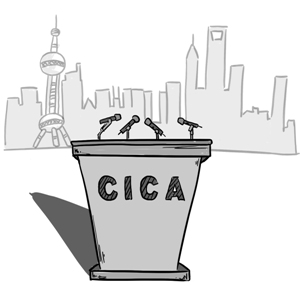METRO SHANGHAI / FENG YU'S COLUMN
City needs more confidence to become true int’l city

Illustration: Chen Xia/GT
Shanghai didn't have the best start to May. Before the public had a chance to recover from mourning two young firefighters who died in a fire in Xuhui district on May 1, two more people died when a building collapsed in Hongkou district on May 4.
The two firefighters died in a case involving group rentals. The investigation found there were 10 people living in the 88-square-meter apartment that caught fire. It gave the authorities cause to start a new campaign targeting group rentals.
Meanwhile city administrators announced a new regulation governing the rental business which took effect on May 1. It said every tenant should have at least 5 square meters of living space and that there should be no more than two tenants per room. In cases of family-unit rentals, young children and elderly family members are not counted.
At the same time, we heard concern for migrant workers who were evicted from the group rentals and had to find new accommodation. Here we have to say that every change in policy will unavoidably hurt some group, but so long as such changes meet the general public's fundamental interests, we have to be realistic.
In the Hongkou accident, a blast caused by a gas canister in one run-down apartment led to the collapse of the whole building. Two people died on the spot and three others were injured. A man surnamed Dai came to public attention as the investigation unfolded.
Dai was a manager of the company in charge of the demolition work for the area, which was to be developed as a commercial project. The demolition started as early as in 2002, but came to a pause in 2006 because of problems with the property developer's cash flow. Dai began to rent out the condemned houses that former residents had already left. Dai has been detained by police and further investigations are under way.
On many occasions when disasters happen, we have to console ourselves by hoping that maybe they can bring about positive change. The two recent tragedies serve as alarm bells in the fields of group rental and demolition projects.
On Tuesday afternoon, a notice on the municipal government's official microblog announced that government departments, educational institutions and social units would have a day off on May 21 when the city hosts the Shanghai summit of the Conference on Interaction and Confidence Building Measures in Asia (CICA), which will be chaired by Chinese president Xi Jinping. The measure is to ensure a smooth passage for attending state leaders and 40 delegations including CICA members, observers and other interested countries and international organizations.
According to the announcement, companies and other bodies can decide for themselves whether to take that day off.
It's definitely good news for those who can enjoy an extra paid day off work in the middle of the week, while students can take a break too. The announcement doesn't say whether the government officials will have extra tasks that day.
The public has reason to question whether it is really necessary to give so many people a day off just to ensure smooth traffic for leaders. It could also be argued that this reflects poorly on the city, implying that it lacks the capacity to hold events of this level without taking extreme measures such as this.
Shanghai wants to be considered an international city, and it often appears on lists ranking cities across the globe according to various criteria.
Last time the city hosted this kind of high-level meeting was the APEC summit in October 2001. Although Shanghai hosted the World Expo in 2010 and it greeted many state heads from all over the world, it was a half-year-long grand event, so the security pressures weren't as intensive as they are for something like CICA.
Friends with family in the police have said officers are not taking breaks right up until the summit in order to prepare for it. From Thursday on, security checks at the city's two airports have been upgraded. High-ranking officials from the ministry of public security have arrived in Shanghai and have inspected major railway stations here and in Suzhou.
The police are therefore under a lot of pressure in the run-up to CICA. We should greatly appreciate their contribution to the security and safety of the general public. But at the same time, the frantic effort in preparing for CICA reflects the reality that Shanghai lacks a systematic mechanism for handling these kind of events.
Other international cities in Europe, the US and even Asia greet a large number of state leaders every year for forums and summits, without people being given an entire day off. Although we must take into consideration the large population of the city and other factors that Shanghai doesn't share with her counterparts, we must admit the city needs more confidence and experience in handling cases like this.
Hopefully, CICA will be a great success and local authorities will gather experience from the event that they can use to better handle such events, with ease and confidence.
The author is the managing editor of Global Times Metro Shanghai. fengyu@globaltimes.com.cn

